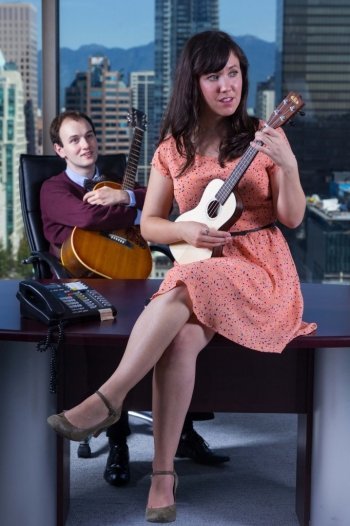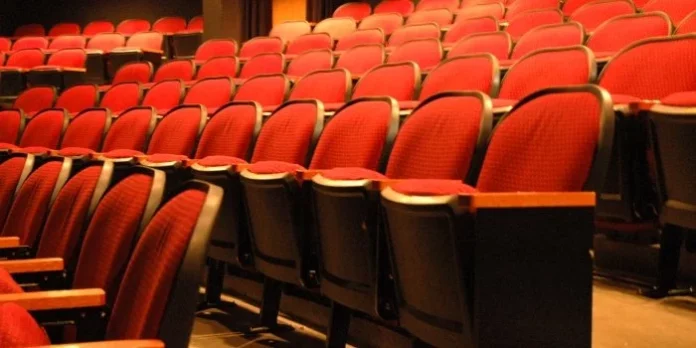The Indie-rock musical Stationary: A Recession-Era Musical returns to the Vancouver stage in a remount at The Cultch.
Telling the story of six young office workers at a floundering advertising company, the musical features a cast of actor-musicians who, under the real and metaphorical fluorescents of life, dream of bigger and better things. Featuring a diverse score from Mishelle Cuttler, book writer and lyricist Christine Quintana has created a musical that continues to resonate with a new generation of theatre-goer.
In the middle of the company’s recent touring production of the critically acclaimed show, Quintana talks to us via email about the musical’s humble beginnings and what has kept it going since its premiere in 2011.
1. Stationary comes from humble beginnings first performed as Parked in 2011. How many revisions has the show seen?
Since Parked, we’ve done three productions of Stationary including this one, and each one has had a new draft of the script and new changes to the music. Every time we’ve worked to make the show clearer, sharper, funnier and deeper. As we grow as artists, our capacity to do so increases and we push ourselves to deliver our best work, every time.
2. What keeps you going with this particular project?
It’s funny because every time we do it I think it might be the last time, but the show just keeps going and going. There’s something about this story that people connect with, and we’re humbled and grateful for that. It’s totally surreal when we talk to people that listen to the cast recording of the music on a regular basis. Over the years, it’s come to mean something to a lot of people and of course especially to us, and we’re grateful every time we get to do it again. It’s incredibly fun to perform in – we’re all challenged to sing, act, dance, and play music, sometimes all at once, and it’s a thrill to keep the audience on their toes. It’s also exciting to see how different audiences connect to the individual characters – you can really feel when people see themselves in one of our characters.
3. Has the central story changed over the years? If so, how?
The central story has remained largely the same, and the themes especially. The last draft brought a couple of surprise changes to how things happen, but it’s the emotional journey of the characters that has really deepened and developed. We’re more mature artists now than when we started, and with more life experience under our belts we’ve got more to bring to the table. Our composer Mishelle is working us hard with more complex and demanding vocal and musical arrangements.
4. Have you stopped tinkering with it?
Yes, for now. At the very least, there are a few jokes in the show that are designed to have a shelf life of three months or less – some of them get written right before we start rehearsals. But I feel like for myself with the script and lyrics, I have arrived somewhere that I’d be proud to call a final draft. The beauty of theatre, though, is that the show can grow and change. There will always be room for that.
5. Does the show still reflect your view of the world when you wrote it? Do you still feel like you’ve been “left behind”?

It does – and I think a lot of the people that I speak to after the show are a little surprised to hear that. The world view in Stationary is both incredibly specific to our generation, but also connected to a universal adulthood experience. The effects of the 2008 economic crash and ongoing gentrification of affordable neighborhoods and rise in property values are things that keenly affect the way young people live in Vancouver and across Canada – as one character says, the recession ended five years ago, but “do you notice a fucking difference?” In the midst of all that, I’m finding that my 20s – as is true for everyone – is about figuring out how to live with more questions than answers. I thought I’d have it figured out by now. I’m mostly realizing that I never will – and maybe that’s okay.
6. In the finale you sing about tomorrow being your best friend. Is it still true?
We aim to leave the audience with room to make their own decision about who wins and who loses at the end of Stationary, but everyone sings “Tomorrow” together. It’s an anthem for the resilience that each of us has – the courage to remind ourselves that change is possible, necessary and attainable. In the last three years, as friends and young adults I’ve watched all of us go through huge life changes, be it career or relationships or personal developments – experience tremendous ups and downs. And in the show, as in our lives, characters struggle with things bigger than themselves, be it job opportunities, life dreams, self-esteem, a thirst for connection – and they learn the hard way that these struggles are life-long. It’s a beautiful ache, to know that every day has the potential to be better than the one before. It’s terrifying to know that you’re the one who can make it happen. I hope Stationary helps people connect with that idea, and that we empower ourselves to keep fighting for the life that you dream for yourself.
7. The show is touring in Barrie, Ontario before returning to Vancouver with a run at The Cultch. How did the Barrie production come about?
Our friend Josh Esptein connected us with Arkady Spivak, the artistic director of Talk is Free Theatre. Thanks Josh! Arkady dug the show, so he picked us up. I think we all still can’t quite believe that we are here (April 10, as I’m writing this) in Ontario, being taken care of by all these amazing folks in Barrie and sharing our show with a whole new audience. The trajectory of this show is always surprising and wonderful and exceeds expectations. To be here with my best friends doing a show we created is absolutely incredible
8. What has the reception in Barrie been like?
Because so much of the humor is very politically specific to Vancouver, we wondered how it would translate. The reaction has been incredible – a lot of the audience has connected to the challenges faced by young people. We had someone tell us that their adult child is heartbroken because they had to move back in with them at 30 after finishing their degree because only unpaid internships were available to them. I also had some interesting chats with women who connected with the fact that Stationary depicts a female-led office environment. The themes are much more universal than we thought! The biggest challenge at this point is that here in Barrie, we’re close enough to see the audience, and on opening night we were so moved by the fact that people in the audience were crying. It’s hard to beat a connection like that, and we’re wonderfully glad it’s resonating with people in that way.
Stationary: A Recession-Era Musical plays The Cultch (1895 Venables St, Vancouver) April 21 – May 2. Visit https://thecultch.com for tickets and information.

